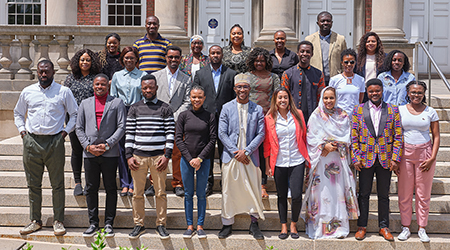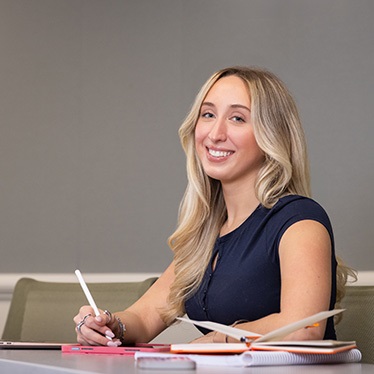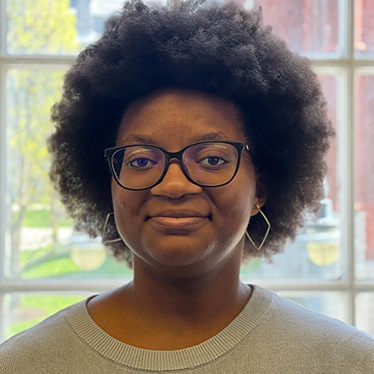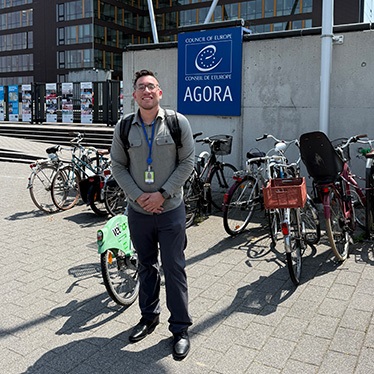Mandela Washington Fellows Ready to Use New Skills to Lift Africa
September 12, 2022
When Mandela Washington Fellow ’22 Laventa Obare spent a few hours distributing a hot meal at Syracuse’s Samaritan Center, she came away with new insights about the United States. “There we could see the homelessness and hunger and poverty,” she said. “In my country there is great disparity between the rich, middle class and the poor. The government can support some people, but there is no structure for that.”
At the Samaritan Center, which provides food and other emergency services, “people made a structure to reduce homelessness and hunger,” said Obare, of Kenya. “At home people would wait for the government to do that.”
Issa Belmond Thullah of Sierra Leone also found visits to Syracuse nonprofits eye-opening. Despite poverty and hunger in his country, “Politicians only think about the next elections,” he said. “They are not thinking about how to fix the structure.”
Obare and Thullah were among 25 young leaders from 21 Africa nations at Syracuse University from June 8 to July 14, participating in the Mandela Washington Fellowship for Young African Leaders, the flagship program of the Young African Leaders Initiative (YALI).
This was the eighth time Maxwell has hosted a Leadership Institute as a part of the Mandela Washington Fellowship. This year's six-week program included 700 young leaders from sub-Saharan Africa working with 27 institutions across the United States. It featured academic coursework, leadership training and networking. This year's Maxwell cohort met in person on campus after two years of virtual programming.

Working closely with the U.S. Department of State’s Bureau of Educational and Cultural Affairs and its implementing partner, IREX, host institutions offer academic and leadership programs to challenge, inspire and empower these inspiring young leaders from Africa.
The Maxwell cohort this year joined the larger group for a virtual summit, where they took part in networking and panel discussions with each other and U.S. leaders from the public, private and nonprofit sectors.
“It’s a program to enhance capacity for leadership in sub-Saharan Africa,” said Stuart Bretschneider, an expert in public management who coordinates the program with John McPeak, a Maxwell professor in the Department of Public Administration and International Affairs and an agricultural economist who researches in Africa.
Central to the program is the fellows’ focus projects, which serve as tangible outcomes of how to apply the fellowship’s skills and concepts to their own counties, Bretschneider said.
Obare, a research medical officer at Kenya Medical Research Institute with experience in adolescent and women’s reproductive health rights advocacy, is working on a project to provide reusable sanitary towels to girls.
Thullah, a research and security analyst and manager of the National Situation Room at the Office of National Security, is working on climate change education and adaptation.
Solutions to social and economic problems “lie within Africa,” Obare said. “You cannot just take a program from the U.S. and drop it there. That fails miserably. Be specific and intentional. If you want to address hunger, build a better road to get this much food to this many people.”
Obare hopes her project will improve conditions for girls in Kenya, where one of five teen girls become pregnant. “Some girls exchange sex for sanitary towels,” she said. “It's a whole cycle. If I introduce this, can we lower teen pregnancy and the number of girls missing school and address gender inequality?”
Obare makes towels, which have been distributed in some communities. “People donate them, but there are not enough,” she said. “We need more that will last.”
Thullah wants to teach rural communities about deforestation. “You have to go to the community and teach them about the effects of deforestation,” he said. “Once you have community acceptance, you can explain, you can say: ‘You are having water shortages because you’re cutting trees.”
Chastising people or aggressively implementing a program does not work, both fellows said. And they need to approach the problem methodically, defining the problem and using data to assess program impact.
“We go to the chiefs as a sign of respect,” Thullah said. “We give the facts: Mercury from mining will do this, this and this. If you use force with people, they will use force. If you give them the facts, then they have the facts. You have to sit with people and educate them and give alternatives,”
The fellows would like to see more community involvement in social problems in their own countries. “Here they hear the little you are doing to help your community and want to help,” Obare said.
The Mandela Washington Fellowship is a program of the U.S. Department of State with funding provided by the U.S. Government and administered by IREX. Syracuse University is a sub-grantee of IREX and has implemented Leadership Institutes as a part of the Fellowship since 2014. For more information about the Mandela Washington Fellowship, please visit the Fellowship’s website at www.mandelawashingtonfellowship.org.
Related News
School News

Dec 4, 2025
School News

Nov 25, 2025
School News

Nov 24, 2025
